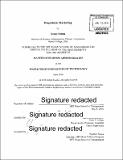| dc.contributor.advisor | Glen L. Urban. | en_US |
| dc.contributor.author | Suzuki, Kengo | en_US |
| dc.contributor.other | Sloan School of Management. | en_US |
| dc.date.accessioned | 2016-09-30T19:35:11Z | |
| dc.date.available | 2016-09-30T19:35:11Z | |
| dc.date.copyright | 2016 | en_US |
| dc.date.issued | 2016 | en_US |
| dc.identifier.uri | http://hdl.handle.net/1721.1/104551 | |
| dc.description | Thesis: M.B.A., Massachusetts Institute of Technology, Sloan School of Management, 2016. | en_US |
| dc.description | Cataloged from PDF version of thesis. | en_US |
| dc.description | Includes bibliographical references (pages 96-97). | en_US |
| dc.description.abstract | Social media plays a large role in marketing strategy for transmitting and exchanging information between companies and consumers. Even for a traditional industry such as banking, social media has become an important and necessary tool for the marketing process. Although regulators have created formal guidelines to ensure financial institutions realize and manage the risk in using social media, many creative marketing approaches relating to social media has been incorporated by players in the financial industry. This thesis analyzes different types of marketing approaches using social media that is employed by financial institutions in the United States and in Japan. The thesis also explores the effects of marketing approaches using storytelling content. A marketing survey was conducted in Japan to evaluate whether storytelling is more effective when authored by a company or by a consumer. A regional Japanese bank, Suruga Bank, cooperated with this study and research by providing source material for the study content that was developed. The concept was to have a consumer share stories about financial services experiences in an effort to provide convincing information that Suruga Bank is a trusted supplier of loans and should be high on other consumers' consideration list. The design included a test of the feasibility of storytelling in multiple channels to evaluate the impact of each treatment. The results of the survey helped me to assess Suruga Bank's current marketing strategy and its corporate structure better. The ultimate goal of this thesis is to make strategic recommendations for Suruga Bank to reinforce its viral marketing strategy and strengthen its corporate communications skills via social media in order to leverage its organizational capabilities. Note: The views expressed in this thesis are those of the author and do not reflect the views of Suruga Bank. | en_US |
| dc.description.statementofresponsibility | by Kengo Suzuki. | en_US |
| dc.format.extent | 97 pages | en_US |
| dc.language.iso | eng | en_US |
| dc.publisher | Massachusetts Institute of Technology | en_US |
| dc.rights | M.I.T. theses are protected by copyright. They may be viewed from this source for any purpose, but reproduction or distribution in any format is prohibited without written permission. See provided URL for inquiries about permission. | en_US |
| dc.rights.uri | http://dspace.mit.edu/handle/1721.1/7582 | en_US |
| dc.subject | Sloan School of Management. | en_US |
| dc.title | Empathetic marketing | en_US |
| dc.type | Thesis | en_US |
| dc.description.degree | M.B.A. | en_US |
| dc.contributor.department | Sloan School of Management | |
| dc.identifier.oclc | 958585290 | en_US |
